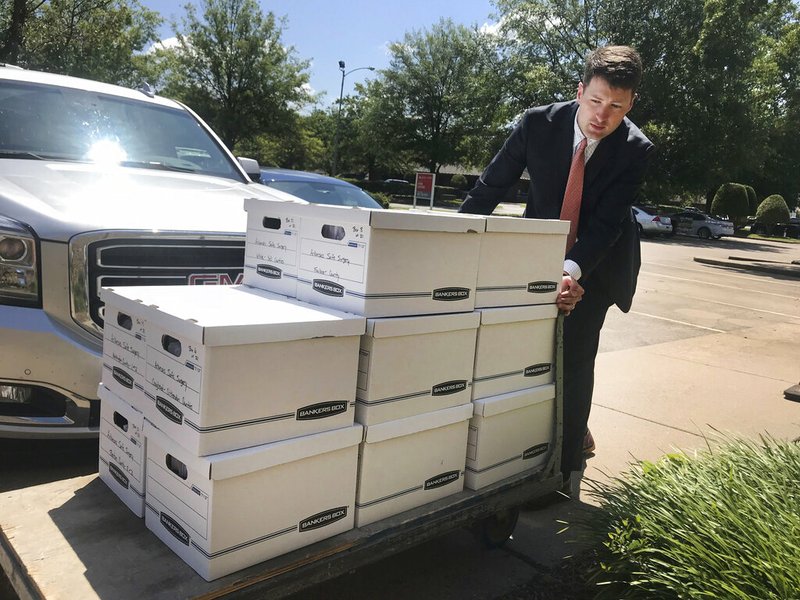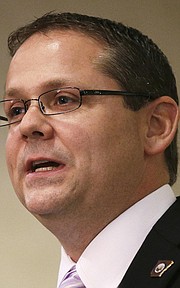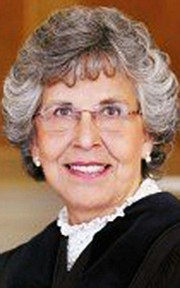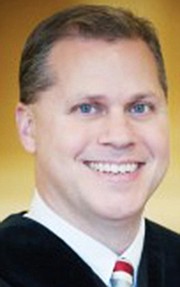A divided Arkansas Supreme Court on Thursday directed Secretary of State John Thurston to count the signatures of registered voters submitted for a proposed referendum on a 2019 law that allows optometrists to perform a broader range of eye surgeries.
Thurston's office had not counted the signatures because of another law enacted this year -- Act 376 of 2019 -- that changed requirements for canvassers, those who circulate petitions.
The Supreme Court, in a 4-3 ruling, said Act 376 contained a defective emergency clause, so the new requirements weren't in effect when the committee submitted its signatures on July 23. An emergency clause is added so that a law takes effect sooner than it would under normal procedures.
In his dissenting option, Justice Shawn Womack, a former Republican state lawmaker from Mountain Home, blistered the court's majority.
Act 579 of 2019 allows optometrists to perform certain surgeries that have been reserved in the past for medical doctors.
"In accord with today's Supreme Court ruling, the secretary of state will commence counting the signatures submitted by Safe Surgery Arkansas," Thurston spokesman Chris Powell said Thursday.
The Safe Surgery Arkansas ballot committee is pushing for the referendum, which would allow voters in the 2020 general election to decide if Act 579 should take effect. The referendum's backers believe eye surgery should be conducted by medical doctors with surgical training.
Alex Gray, an attorney for Safe Surgery Arkansas, said its officials are pleased with the Supreme Court's ruling.
"We are glad to move past this unnecessary hurdle and delay, and we look forward to having the voice of Arkansas voters heard next November," Gray said in a written statement.
But Vicki Farmer, chairwoman of the Arkansans for Healthy Eyes committee that supports Act 579, said, "We are reviewing today's decision by the Arkansas Supreme Court concerning the effectiveness of Act 376, and we're considering possible legal options in light of the fact the Court applied Act 376 as an immediately effective statute in a case last May (Arkansas True Grass v. Rutledge, 2019 Ark. 165).
"The court did not address this precedent in today's ruling," she said in written statement.
"We remain committed to doing what's right for the tens of thousands of patients across Arkansas, who are counting on Act 579 to receive better access to quality eye care," Farmer added.
Attorney General Leslie Rutledge is disappointed in the Supreme Court's decision and believes the emergency clause of Act 376 was valid and effective, said Rutledge spokeswoman Rebecca Jeffrey.
THURSTON'S DECISION
On Aug. 13, the Safe Surgery Arkansas committee asked the Supreme Court to order Thurston to certify the committee's petitions to place on the 2020 general election ballot the proposed referendum on the eye surgery law.
That came after Thurston's office concluded Aug. 2 that the committee failed to submit enough valid signatures of registered voters to qualify the proposed referendum for the ballot. Thurston's office said the committee's petition needed 53,491 signatures, but had only 23,953.
Thurston declined to count most of the signatures submitted by the Safe Surgery Arkansas committee because he said they were obtained in violation of Act 376 of 2019, according to the state Supreme Court.
Before Act 376, paid canvassers have been required to give a written statement to the petition's sponsor, swearing they have never been convicted of certain crimes that would disqualify them from serving as canvassers, the court said.
Act 376 added the requirement that the sponsor must give those statements to the secretary of state's office before the canvasser can begin collecting signatures.
Normally, a law becomes effective 90 days after the adjournment of the session in which the law is passed, but Act 376 contained an emergency clause purporting to give it immediate legal effect in March. Ninety days after adjournment of this year's regular session was July 24.
The stated basis for Act 376's emergency clause is "to avoid confusion in petition circulation," Justice Josephine Hart said in the court's majority opinion.
"Act 376's emergency clause is not responsive to some real-life circumstance making immediate legislative enactment 'necessary for the preservation of the public peace, health and safety,' as contemplated by Article 5, [Section] 1 of the Arkansas Constitution," she wrote.
"Instead, the only purpose this emergency clause can functionally serve is to simply bring Act 376's new requirements into operation at an earlier time (effectively voiding referendum efforts brought pursuant to the otherwise-then-still-existing legal framework)," Hart said.
"Here, this would disenfranchise over 60,000 Arkansas citizens who have expressed through their signatures the desire to hold a referendum on Act 579 on the November 2020 ballot, all because the Legislature decided (1) that it was time to add additional requirements for procuring those signatures, and (2) that those additional requirements should become effective immediately," she wrote in the court's majority opinion.
"Without expressing any opinion on the constitutional appropriateness of the rule-changes themselves, we can readily determine that this situation does not amount to an 'emergency,' and that reasonable people could not disagree on this question," Hart said. "Act 376's emergency clause is therefore set aside."
Since Act 376's emergency clause was ineffective, the law's new requirements weren't in effect at the time the Safe Surgery Arkansas committee filed its proposed referendum and supporting signatures, she said.
"Accordingly, we direct the secretary of state to address [the Safe Surgery Arkansas committee's] filings seeking a referendum pursuant to the pre-Act 376 legal framework for initiatives and referenda," Hart said.
Justices Karen Baker and Robin Wynne agreed with Hart. Justice Rhonda Wood concurred in a separate opinion.
DISSENTING OPINION
Womack dissented, along with Chief Justice Dan Kemp and Justice Courtney Hudson.
Womack, who wrote the dissenting opinion, said he disagrees with the court's majority opinion that the emergency clause is defective.
"By finding the emergency clause of Act 376 defective, the majority is, in effect, stating that no reasonable person could believe the act's amendment to the initiative and referendum process -- an integral part of Arkansans' democratic participation -- constitutes an emergency for which immediate effectiveness is demanded," he wrote.
"Such an assertion by the majority is, in my opinion, disingenuous and born of hubris," Womack said.
"The majority, in this 4-3 decision, is essentially saying that it alone possesses the capacity of reasonable interpretation -- not the 78 duly elected men and women of the Arkansas House of Representatives who voted for the bill, not the 26 duly elected men and women of the Arkansas Senate, who voted for the bill, and not the three dissenting justices of the Arkansas Supreme Court," Womack wrote in his dissenting opinion.
Womack served in the Arkansas House of Representatives from 1999-2003 and the state Senate from 2003-09. He has been on the state Supreme Court since 2017, after serving as a circuit judge from 2009-16.
Sen. Mat Pitsch, R-Fort Smith, sponsored Act 376 of 2019. He declined to comment on Thursday afternoon about the high court's ruling.
Act 579 of 2019 will allow optometrists to administer injections around the eye, remove bumps and lesions from eyelids, and perform certain types of laser surgery performed by ophthalmologists -- specifically capsulotomy, a surgery performed after cataract surgery, and trabeculoplasty, a procedure to reduce pressure from glaucoma. Optometrists are still banned under the new law from doing cataract surgery and radial keratotomy surgery, and selling prescription drugs.
The law also requires the state Board of Optometry to establish credentialing requirements for a license to administer or perform these procedures. It also requires each optometrist who meets the requirements for certification of authorized laser procedures to report to the board regarding the outcome of the procedures and to also report to the state Board of Health.
PUBLIC HEARING SET
Howard Flippin, the state Board of Optometry's executive director, said in an interview the board approved rules for Act 579 in November and plans to hold a public hearing on the rules on Feb. 13.
The rules won't go into effect until the Legislative Council signs off on the board's rules, he said, and the rules must be in effect before optometrists may perform the broader range of eye surgeries allowed under Act 579.
Rep. Jon Eubanks, R-Paris, sponsored Act 579 of 2019.
Eubanks said Thursday in an interview that "I am in the legislative branch [and] I try to worry about that part of it.
"I'll let the attorneys and the judges try to figure out the rest of it," he said.
The legislation creating the act -- House Bill 1251 -- failed to clear the House Public Health, Welfare and Labor Committee on Feb. 19 before clearing the committee on March 5, after it was amended. Laura Hawkins, a lobbyist for the Arkansas Ophthalmological Society, reported spending more than $110,000 in the group's unsuccessful request to defeat Act 579 in this year's regular session, the largest amount reported by any lobbyist in the first four months of this year.
The Safe Surgery Arkansas committee reported receiving $726,615 in contributions and spending $713,693.05 through Oct. 31, leaving a balance of $12,931.95, according to its latest report on the Arkansas Ethics Commission's website. The Arkansas Ophthalmological Society contributed $155,000 to the Safe Surgery Arkansas committee.
The Arkansans for Healthy Eyes committee reported collecting $281,376 in contributions and spending $158,998.59 through Oct. 31, leaving a balance of $122,377.41.
A Section on 12/13/2019




